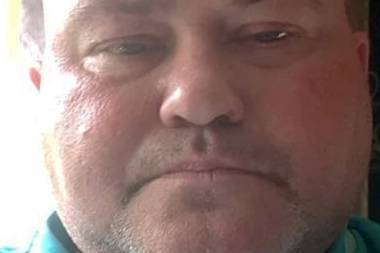British citizen Paul Urey, captured in April by pro-Russian forces in eastern Ukraine and accused of having fought as a mercenary in Donbas, died this Sunday in a prison in the self-proclaimed Donetsk People’s Republic, as reported by the defender of the People, Daria Morozova, to the Donetsk News Agency.
The International Legion has claimed that the British national was a humanitarian worker. These statements coincide with the complaint made in April by the UK-based organization Presidium Network, where they maintained that the pro-Russians had captured Urey and another volunteer.
According to the pro-Russian statements, in the first medical examination Urey was diagnosed with “a series of chronic diseases”, including insulin-dependent diabetes, damage to the respiratory system and kidneys, and a series of diseases of the cardiovascular system.
The Ombudsman of the self-proclaimed Donetsk Republic has also stated that the British citizen “was in a depressed psychological state due to indifference to his fate in his homeland.”
The separatist policy has argued that Urey understood that “British representatives ignored even the possibility of negotiating his return as part of the prisoner exchange procedure.” He has further claimed that they did not provide the necessary medical supplies through the International Committee of the Red Cross (ICRC).
After accusing London of the alleged poor state of health, Morozova has assured that, “despite the seriousness of the alleged crime” of which he was accused for having fought in the ranks of Ukraine, “Paul Urey was given medical assistance correspondent”. “However, given the diagnoses and stress, he passed away on July 10,” she said.
According to the version of the pro-Russian Donetsk, Urey was captured in April while trying to pass a checkpoint of the separatist forces. According to the Donetsk News Agency, the British led combat operations and also recruited and trained mercenaries for the Armed Forces of Ukraine. Before the Russian military campaign in Ukraine, he would have fought in Afghanistan, Iraq and Libya. “He was a professional soldier,” says the pro-Russian agency.
Morozova has assured that international organizations, as well as official representatives of the United Kingdom, were notified of the capture of Urey, but “there was no reaction” from London.
Despite the statements of the pro-Russian spokeswoman, the Ukrainian International Legion has confirmed that the deceased Briton was a humanitarian worker. “We are saddened by the news of the death of Mr. Urey … he was not fighting in the Ukraine. He was an employee of a humanitarian organization,” the Legion’s press service said.
For its part, the Presidium Network, a non-profit organization based in the United Kingdom, announced on April 29 that two aid workers it knew, Paul Urey and Dylan Healy, had been captured by the Russian army in the south of Ukraine while trying to evacuate a woman and two children
According to the Russian Ministry of Defense, there are approximately 2,700 mercenaries in Ukraine, who await the maximum prison sentence if they are captured.
The Supreme Court of the self-proclaimed Donetsk People’s Republic sentenced two British citizens, Shaun Pinner and Aiden Aslin, and a Moroccan, Graguim Saadun, to death in June for considering them mercenaries.
The Court of Human Rights (ECHR) has issued precautionary measures for the three prisoners captured during the Russian military campaign in Ukraine, but Russia has already said that it will not comply with them. Russia alleges that International Humanitarian Law does not cover mercenaries as combatants. However, both Ukraine and the ECHR have stated that all three belong to the Ukrainian Armed Forces. All three were assigned to the 36th Marine Brigade in Mariupol, in the Donetsk region.
The British Foreign Office has summoned the Russian ambassador in London, Andrey Kelin, to show its “deep concern” over Urey’s death.
“I am shocked to hear reports of the death of humanitarian worker Paul Urey while in detention by Russian allies in Ukraine. Russia must bear full responsibility for this,” Foreign Secretary Liz Truss said in a statement.
For the head of British diplomacy, the citizen was arrested “while carrying out humanitarian work” since he was in Ukraine to “help people in the face of the Russian invasion.”
Conforms to The Trust Project criteria
















